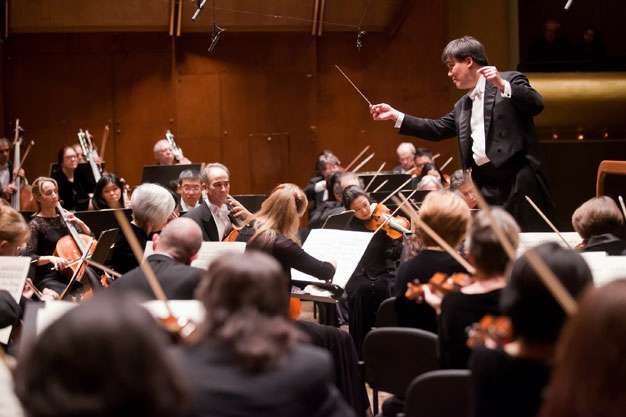|
Back
Three Cosmic Constellations New York
Avery Fisher Hall, Lincoln Center
11/29/2013 - & November 30, 2013
Wolfgang Amadeus Mozart: Symphonies No. 39 in E-flat major, K. 543, No. 40 in G minor, K. 550, & No. 41 in C major (“Jupiter”), K. 551
New York Philharmonic Orchestra, Alan Gilbert (Conductor)

A. Gilbert/New York Philharmonic (© Chris Lee)
”You have to tell the story that’s in the music: the story of Mozart is everybody’s story.”
Alan Gilbert, on this All–Mozart Program
Sorry, Maestro, Mozart’s story is as remote from “everybody’s story” as Alpha Centauri is from my spaniel. Perhaps Mozart’s life has a few parallels with our own: complex father-son relationship, elation at success, depression at failure, the usual money worries, stupid jokes. But not even last night’s esteemed conductor could claim that the cosmos-weaving final movement of the “Jupiter” or the clarinet solo of the 40th or the mysterious opening of the 39th has the slightest echo of our life–or of Mozart’s conscious life.
And after listening to Mr. Gilbert conduct those three last symphonies, one understands why Peter Schaeffer’s play was called Amadeus rather than Wolfgang or Mozart. It really did come from Up There.
(Even the late Chistopher Hitchens said the only time he sensed there might be Something outside ourselves came when he listened to Mozart.)
Yet Alan Gilbert did pull off a more mundane miracle. Listening to three works by the same composer written within a few months of each other might tend to overkill. Mr. Gilbert, scoreless and exuberant, gave each of these three final symphonies straight, rarely idiosyncratic readings. The result was an evening which passed all too quickly.
Wisely, Mr. Gilbert played the three in chronological order, beginning the 39th with a seriously mysterious introduction, then going into an almost inevitable graceful first theme. I always think of Elliott Carter’s comment that Mozart never needed transitions or segues, that he would suddenly taken any path he wanted to. In other words, he never fitted into the “classical” setting: he was so impulsive that we never even notice the kind of changes which more conservative Classical composers would have shunned.
Mr. Gilbert didn’t need to set the stage either. This was a symphony of euphony, conducted with the most graceful touch.
I was raised up on Bruno Walter’s more romantic 40th Symphony and always wonder whether the conductor might give the Walter unexpected pause at the end of the first movement development. But Mr. Gilbert didn’t need to do this. Mozart, a great tunesmith when he needed to be, worked here with the most unworkable monotonous eight opening notes, transforming them into a glowing world of their own. All that Mr. Gilbert had to do in this case was let the notes sing for themselves.
Then again, the Philharmonic strings last night were as velvety as they have ever sounded. Added to that Mozart’s rippling woodwind scales (more Arcadian in three measures than the complete “Pastoral” symphony). The horns in the Minuet had a hunting-horn sound, the finale was briskly played.
Of the infinite Mozart mysteries, either personal or musical, none are as mysterious as the finale of the “Jupiter” symphony. Any music student can analyze the most labyrinthine Bach fugue or Schoenberg quartet. But I dare anybody, except the most pedantic theorist to “solve” these incredible measures.
Like the opening of the 40th, Mozart takes four banal notes, plays with them, brings in a few fanfares, turns them around, then, with a good orchestra–and the Phil was at its best last night–suddenly we are in a gorgeous warehouse of melodies, themes, motives. What happens then is that Mozart, dashing from major to minor to fugues to changes of keys, impetuously decides to let us hear all five themes together.
Not as a pentathematic quodlibet, not as a tricky piece of legerdemain, but only because this, in Mozart’s mind, was an inevitability. And much as we are so conscious, trying to figure out how he does it, those measures are another cosmic surprise.
Mr. Gilbert again let the music ride on its own momentum. Like Mozart, he didn’t need to emphasize or subordinate more than the notes called for. And with an orchestra up to that kind of conducting, last night (and tonight) we were in the presence not of “everybody’s story” but a story created by the spirit of one man and never to be created this way ever again.
Harry Rolnick
|